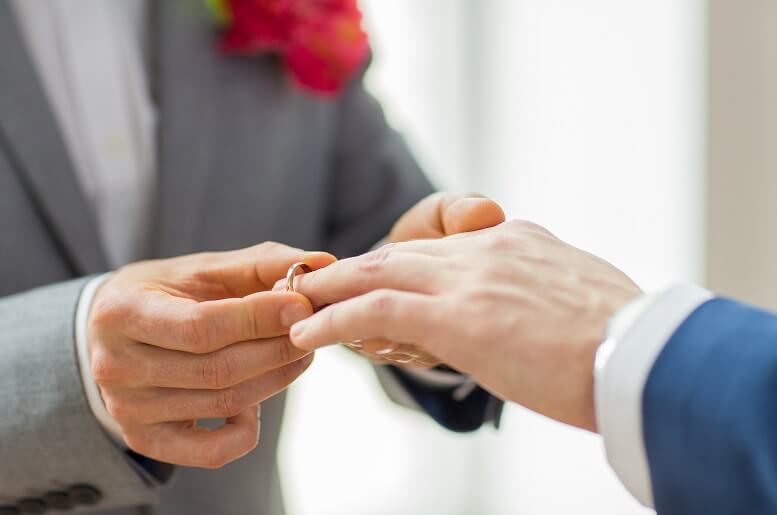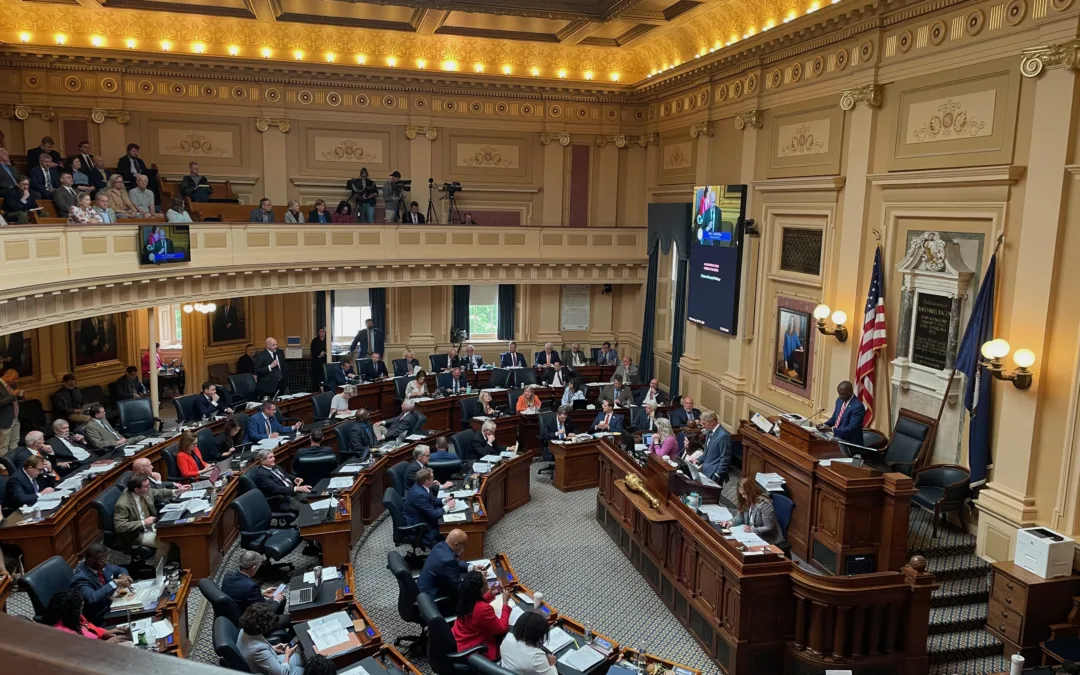
“Names matter. Names like mom and wife make all the difference in the world,” supporters testify.
RICHMOND – Two identical resolutions to legalize marriage equality in Virginia have made it to the House and Senate floors.
House Joint Resolution 582 and Senate Joint Resolution 270 both propose constitutional amendments which would give all Virginians the fundamental right to marriage.
The entirety of the amendments text reads “the right to marry is a fundamental right, inherent in the liberty of persons, and marriage is one of the vital personal rights essential to the orderly pursuit of happiness. The Commonwealth and its political subdivisions and agendas shall issue marriage licenses, recognize marriages, and treat all marriages equally under the law regardless of the sex or gender of the parties to the marriage. Religious organizations and clergy action in their religious capacity shall have the right to refuse to perform any marriage.”
Isn’t Same-Sex Marriage Already Legal?
Of course, the Supreme Court made the decision to federally legalize same-sex marriage in 2015. In the case of Obergefell v. Hodges, the court’s ruling said that under the Fourteenth Amendment, states must grant licenses and recognize marriages between two people of the same sex.
However, the current political leanings of the Supreme Court lead some advocates to question whether that decision might be repealed.
RELATED: Yes, Same-Sex Marriage is Legal. But Virginia’s Constitution Still Says Something Different.
Conservative Court Threatens Same-Sex Marriage
Over the course of his term, former president Donald Trump made three appointments to the U.S. Supreme Court. All three of his appointees, including Neil Gorsuch, Brett Kavanaugh, and Amy Coney Barrett, were controversial due to their deeply conservative political views. Out of the nine members of the Supreme Court, only three now have liberal political leanings. That’s why supporters of the bill say its passage can not be delayed.
“Even if the United States Supreme Court were to change its mind with some new appointments perhaps by the former president, we still have that guarantee in Virginia. It’s a resounding statement that indeed all Virginians are equal before the law,” said Del. Mark Levine (D – Alexandria).
This year Levine became the first openly gay man to run for Lieutenant Governor of Virginia. He is the sponsor of another resolution to legalize marriage equality in Virginia, which the committee rolled into HJR 582.
Like Del. Levine, Del. Mark Sickles (D – Franconia) is among the handful of openly queer people currently serving in the General Assembly. He’s also the chief patron of the joint resolution to create a fundamental right to marriage for all Virginians before the House.
According to Sickles, it’s unclear what would happen to existing marriages between same-sex couples if legalization does not remain federally recognized. But that uncertainty could work in favor of marriage equality advocates.
“Were that awful eventuality to emerge, I’m positive that they would allow any two persons who have been married to retain their marriage rights,” Sickles said. “But I think it’s a question just like that would lead the court, especially John Robert’s court, not to reverse course.”
Advocates Say Marriage Equality Provides Security
Advocates and members of the LGBTQ+ community spoke in favor of the proposed resolutions during a meeting of the Senate Committee on Privileges and Elections Thursday.
Zowee Aquino, community health manager at the National Korean American Service and Education Consoritum, testified to the committee. They said the fundamental right to marry will also help secure the rights of transgender people, and will hopefully lead to a recognition of rights for disabled people.
“This resolution will provide security to myself and other Virginians, particularly those like me who are planning to get married with partners who are transgender and have chronic health conditions. I would love to be the next of kin for my partner, if possible, and make sure that she is secure,” Aquino said.
Carol Schall, who was a plaintiff in a noteworthy marriage equality lawsuit from 2013, testified at the same hearing. She said the issue of marriage equality isn’t only about couples. It’s also about their families, like the one she and her partner have made with their daughter Emily.
“Names matter. Names like mom and wife make all the difference in the world. That’s what we won when we won our Supreme Court challenge. The right to call each other family and to be legally recognized as such in Virginia,” said Schall.
Virginia’s Ban on Non-Heterosexual Partnerships
Under the current Constitution of Virginia, the definition of marriage states it is “only a union between one man and one woman.”
But it wasn’t always that way.
In response to a growing societal acceptance of LGBTQ+ people in the U.S., Republican lawmakers passed an amendment in 2006 to restrict the definition of marriage.
“At the time, I think religious conservatives could see what was happening in society and seeing that more and more people were accepting of people with different sexual orientations,” said Sickles.
The Marshall-Newman amendment, named after the delegate and senator who sponsored it, didn’t stop at limiting marriage to heterosexual relationships. It also added language to the constitution explicitly banning unions designed to have the effect of marriage, like domestic partnerships.
The amendment states “nor shall the Commonwealth or its political subdivisions create or recognize another union, partnership, or other legal status to which is assigned the rights, benefits, obligations, qualities, or effects of marriage.”
“Marshall-Newman, when it came, was a real kick in the gut. It was fellow Virginians saying gay and lesbian, bisexual Virginians did not have equal rights under the law. That we could not be married the way the straight Virginians were. For me, it was truly painful. And for me, a very dark moment in Virginia history and in American history,” Levine said.
The proposed resolutions will strike the entirety of the Marshall-Newman amendment from the Constitution of Virginia.
A Long Road to Ratification
Even legislators approve it during this session, it will take another two years for the constitutional amendment to be ratified.
In Virginia, members of the General Assembly must vote not once, but twice on whether to approve a constitutional amendment. Additionally, these votes have to be separated by a general election. That means that the soonest the General Assembly can vote on this amendment again is after November of this year.
Once it gets approval from the General Assembly twice, a referendum on its inclusion in the constitution has to happen. Then, only after over 50% of Virginians vote in favor of the amendment, can it finally become ratified in Virginia.
What Can You Do To Support the LGBTQ+ Community?
If you want to encourage lawmakers to approve legislation to legalize marriage equality in Virginia, give them a call! You can find your legislators’ information by entering your address here.
Want to support the LGBTQ+ community in other ways? Donating or volunteering at any of the following organizations is a great place to start!
Politics

Youngkin, Democrats to start over on budget talks
The Republican governor stood with Democratic leaders in the General Assembly on Wednesday in a bid to ease tensions over their budget debate....

VIDEO: Domestic abuse victims speak out against the gun law bills Gov. Glenn Youngkin vetoed
Senate Bill 47 and House Bill 46 aim to close the loophole that allows offenders to transfer their firearms to someone else instead of relinquishing...
Local News

Virginia verses: Celebrating 5 poetic icons for National Poetry Month
There’s no shortage of great writers when it comes to our commonwealth. From the haunting verses of Edgar Allan Poe, who found solace in Richmond's...

Join the fun: Recapping Family Literacy Night’s storybook adventures
When’s the last time you read a book aloud with a loved one? If it’s difficult to answer that question, then maybe it’s time to dust off that TBR...




